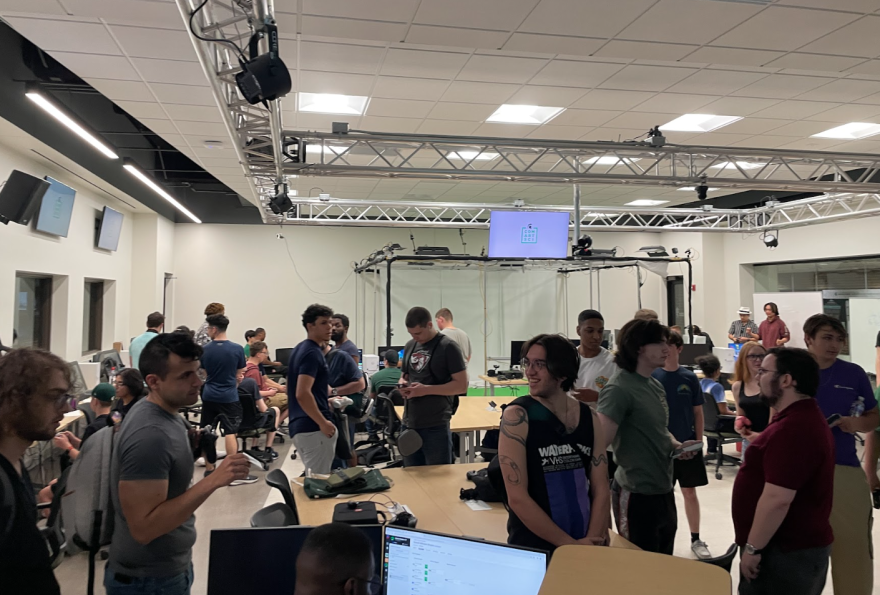In recent years, esports have evolved into a world of opportunity for players. While many still use gaming to escape the stress of daily life, some use the sport to earn scholarships and build careers.
Chris Bilski, Michigan State’s director of esports, said the number of schools with varsity esports teams has grown from six to 30 in the last few years, and he is excited to compete against other schools in the Big Ten like other MSU sports teams do.
The scholarships offered by MSU will vary in amount, but will be of the partial ride variety. Much like varsity sports, where most athletes are on less than full rides.
The esports world demands the best players live focused lives on their sport, akin to other MSU varsity athletes on campus.
“If you look at our varsity esports program, it’s similar to what you would see from any other varsity athletic program,” said Bilski. “The amount of practices we have, our match schedules, we do video and film review just like any other athletic team, and we work out. We have fitness and nutrition programs built into our teams as well.”
Michigan State senior Daniel Weatherspoon, the captain of the Smash A team, said he is happy with the direction that Spartan esports is headed, but wishes the growth happened earlier in his academic career.
“Esports gives people another way to earn a college scholarship,” said Weatherspoon. “Even with less of a time commitment. Some people play sports their whole lives to earn a scholarship. People can get good at a game in just a year or two and now have the opportunity to do the same.”

Bilski said that esports becoming more common and more visible will help to give people a better understanding of what goes into it. In order to do that, a major catalyst is holding more live events.
“I started my esports journey eight or nine years ago, and my parents were supportive of it, but I don’t really think they got it, until I took my dad to a professional esports event,” said Bilski. “When he was there at a sold-out arena, there were screaming fans and everyone was going crazy, it felt like any other collegiate sporting event. Having live events where people can feel that passion and energy and make the connection that this is sports and what they already know just with a slightly different feel.”
Weatherspoon said he grew up playing traditional sports, but video games were always a part of his life. But, when he could no longer play traditional sports and came to MSU, esports filled that void.
“Esports was a way for me to be part of a team,” said Weatherspoon. “It satisfies my competitive drive, and it’s stress relieving.”
Weatherspoon said he loves the direction that collegiate esports is headed, but there is still some ground to cover.
“I’d like to see more traveling like other teams do. We play a lot online, which isn’t really a realistic way to play these games. There can be connection issues or lag, so something I’d like to see in the future is more funding for traveling. The team really benefits from that.”
Bilski said having a sense of community is important, but so is a balance between esports and academics, which is something he is trying to build the program around at MSU. Esports has an instant play ability that traditional sports do not have, so extra steps must be taken to avoid losing that balance.
“We have study halls for all our incoming freshmen and players that are below a certain GPA just to make sure that we have the right priorities within our program,” said Bilski. “Your goal here at Michigan State is to be here for four or five years and then you graduate, that’s what success looks like.”
Bilski said a lot of students involved in esports clubs aren’t involved in any other extracurriculars, so providing support for these students and a place where they can come together allows them not only to be connected to the university and be proud that they’re a part of Michigan State, but also to connect with other students who share the same interests.
“For me as a person, esports lies at this intersection of a love of competition and a passion for gaming,” said Bilski. “I grew up playing sports, and now esports and gaming has transitioned to a social thing for me. The competition is exciting and fun, but the building of relationships and friendships and community, that’s the stuff that lasts much longer.”
Bilski said that the opportunities in the world of esports don’t end when a player’s collegiate career ends, as there are plenty of job opportunities as well.
“For parents, understanding that this is a place where if they’re passionate about something, then they’re going to find support from the university. A lot of times when you look at life after college, esports and gaming is a way for someone to take something they’re excited and passionate about and funnel it into a potential career that will serve you for the rest of your life.”

